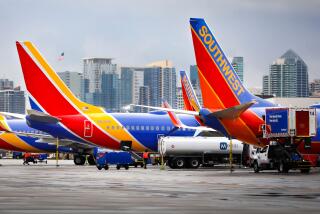Denver Fares Could Begin Descent
Low-fare king Southwest Airlines has a bumpy reception waiting for rival United Airlines when it emerges from bankruptcy protection next year.
Southwest plans to start flying to Denver, one of United’s largest hubs, in January or February -- just as United plans to complete a painful, three-year restructuring under Chapter 11 of the bankruptcy laws.
The new service was announced by Southwest last week, and the carrier is expected to unveil specific flights and fares today. The initial Denver flights probably will include service to at least one city in California, where Southwest is the largest airline, with 638 daily departures, analysts said.
Southwest’s arrival in the Mile High City probably will result in cheaper fares for Denver-bound travelers. When the Dallas-based airline enters a market, it tends to trigger a scenario known as the “Southwest effect”: a reduction in ticket prices as rivals match its fares to avoid losing market share.
“I think the fares are still relatively high” in Denver, Southwest Chief Executive Gary Kelly told analysts last week. “The opportunity is there.”
The move will put added pressure on United -- the nation’s second-largest carrier, behind AMR Corp.’s American Airlines -- in a market that it has dominated for years.
United commands nearly 57% of the passenger traffic at Denver International Airport with nearly 400 daily departures, including flights to Los Angeles, San Francisco, Orange County, Burbank and San Diego.
Those Denver departures also include 44 flights by United’s low-cost discount subsidiary, called Ted -- whose service includes flights from Denver to Ontario -- along with regional airline service operating as United Express.
The other significant player in Denver is Frontier Airlines Inc., a Denver-based discount carrier that serves 47 markets, including Los Angeles and Orange County, in 28 states and Mexico. Frontier has nearly 20% of Denver’s passenger traffic.
Southwest’s entrance “is going to lower the fares for everybody, so it’s going to make it much more important for United and Frontier to be even more diligent about cutting costs,” said Ray Neidl, an analyst at Calyon Securities in New York.
Indeed, Southwest’s Denver service will present United with a rigorous test of its post-bankruptcy fitness. United, a unit of UAL Corp. and based in Elk Grove Township, Ill., used the Chapter 11 process to slash its annual costs by more than $5 billion a year. The goal: to compete with low-cost, low-fare carriers such as Southwest and Frontier and still make money.
United said it was ready to defend its Denver turf.
“We look forward to competing with Southwest, as we do in other cities,” United Chief Executive Glenn Tilton said in a speech last week to Denver business and civic leaders. Southwest, he added, is “a reminder that our challenges will not cease the day we exit Chapter 11.”
Sean Donohue, a United vice president in charge of Ted, vowed that United would be “spot-on competitive from a price perspective.”
United’s website on Wednesday quoted a one-way coach ticket from Los Angeles International Airport to Denver at $112.20 for travel Feb. 1; the price jumped to $228.70 on flights from John Wayne Airport in Orange County to Denver. Frontier’s fares on those two routes were somewhat lower.
Donohue also said Southwest’s arrival in Denver “has not caught anyone by surprise.” A look at Southwest’s route map, he said, shows “a big, gaping hole” in Colorado between Southwest’s heavy presence in California, Phoenix and Las Vegas and its destinations east of the Rocky Mountains, such as Chicago.
Southwest itself calls Denver “an obvious gap” in its system.
The airline once served Denver but only briefly, from 1983 to 1986, at the old Stapleton International Airport. Southwest left as Stapleton’s congestion problems grew, then stayed away after the $5-billion Denver International Airport opened in 1995.
Southwest, the only U.S. airline that has been consistently profitable over the last three decades, has avoided many of the largest airports for most of its 34-year history. The carrier has preferred outlying airports that facilitate the quick turnaround of its Boeing 737 jetliners and thus help keep costs down.
But to keep growing, Southwest has become more aggressive and is more willing to take on rival carriers at major airports. In mid-2004, for instance, it began flying to Philadelphia, a hub airport for US Airways Group Inc.
With United and Frontier entrenched in Denver, Southwest has its work cut out. And United said it could fend off Southwest’s challenge because United offers first-class sections, international destinations, assigned seating and other amenities that Southwest lacks.
“Should Southwest decide to fly from Denver to every city in their network, they would still only offer 60% of the coverage United offers today,” United’s Tilton said in his speech. “We will be delighted to fly you to the 800 destinations they can’t.”
*
(BEGIN TEXT OF INFOBOX)
Southwest’s growth
Southwest Airlines plans to start flying to Denver early next
year, extending the discount carrier’s steady expansion of the
last decade.
Share of passenger traffic at Denver airport for August
United: 56.7%**
Frontier: 19.3%
American: 4.2%
Delta: 3.4%
Other: 16.4%
** Includes Ted and regional carriers operating as United Express.
Sources: Southwest Airlines, Denver International Airport
More to Read
Inside the business of entertainment
The Wide Shot brings you news, analysis and insights on everything from streaming wars to production — and what it all means for the future.
You may occasionally receive promotional content from the Los Angeles Times.











